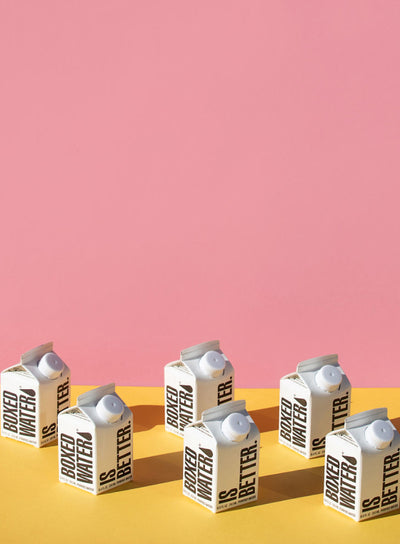As the pioneers of a sustainable alternative to plastic water bottles since 2009, we’ve continued to invest in research and testing of new materials to find more sustainable options. Boxed Water cartons are 100% recyclable and are made from trees--and now we have found a way to incorporate trees into our cap through bioplastics! A question often asked is, “what are bioplastics?”
Since the 1950’s our world has produced more than nine billion tons of plastic, and 165 million tons have landed in our oceans. Solving this plastic problem is an issue that is crucial to the health of our planet. In order to help mitigate this environmental crisis, companies are turning to bioplastics as an alternative to petroleum-based plastics.
What is Bioplastic?
Bioplastic refers to material made from plants like sugarcane, corn or trees. Conventional plastic is made from the same kind of oil that you put in your car. That’s right--petroleum. Petroleum is a non-renewable fossil fuel that generates air pollution. Bioplastics are created from renewable resources and help to eliminate air pollution.
One of the main contributing factors that bioplastics has to offer is its ability to offset the carbon footprint. This is because as plants grow they absorb carbon dioxide from the atmosphere and release oxygen. Forests are the environment's best defense because they absorb the most carbon dioxide. They also do not require the energy and resources that are needed to grow crops, like sugarcane.
The most common form of bioplastic is made by extracting sugar from plants like sugarcane or corn and converting it into Polylactic acid (PLA). This is likely the type of bioplastic you’ve seen at the store as it’s made into utensils, cups and textiles.
Another common form of bioplastic is through the use of ethylene created from a renewable source, like tree oil, rather than fossil fuels. Creating a renewable PE (polyethylene) - this is what Boxed Water’s cap are made from!
[mobile-adblock]
So you're wondering if Bioplastics are Recyclable?
Although PLA bioplastics look like normal plastic packaging, they are not recyclable. Consumers who put them in recycling bins actually can contaminate the system, potentially spoiling an entire batch. PLA is, and often advertised as, a compostable product. The problem with this is industrial composting is necessary to heat the bioplastic enough to allow the microbes to break down. Without this intense heat, the bioplastic will not degrade on their own in a meaningful time frame--either in a landfill or in an at home composting set up.
Renewable PE may not be compostable but it is 100% recyclable! The way that this bioplastic is created allows it to have the same properties and high-density polyethylene (HDPE) and therefore are accepted by recycling programs. This is why Boxed Water has thoughtfully worked hard to find a bioplastic that continues to make our product 100% recyclable and increase our packaging to be 92% renewable!
Although it can get complicated, bioplastics are still a step in the right direction. At Boxed Water we’re dedicated to advancing the use of renewable resources, as well as recycling, planting trees, cleaning our beaches and advocating for more sustainable living practices.

